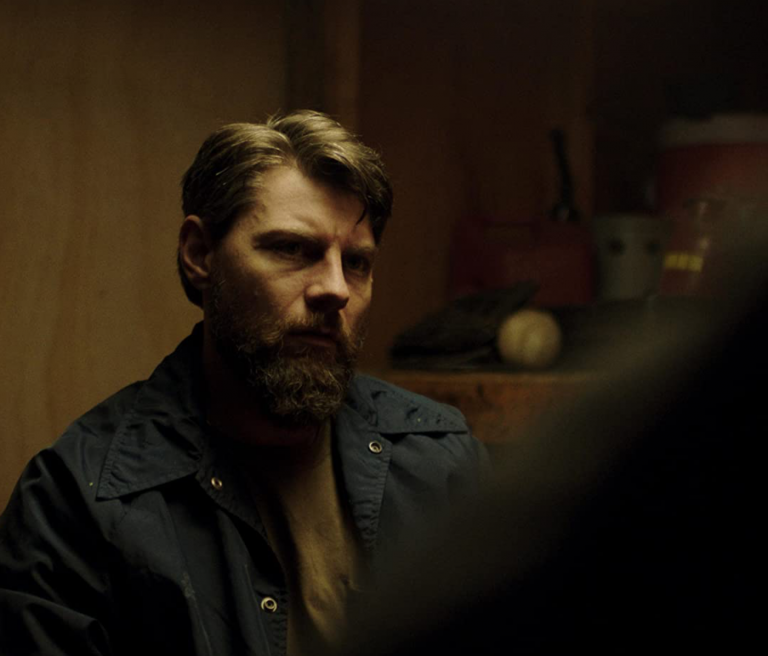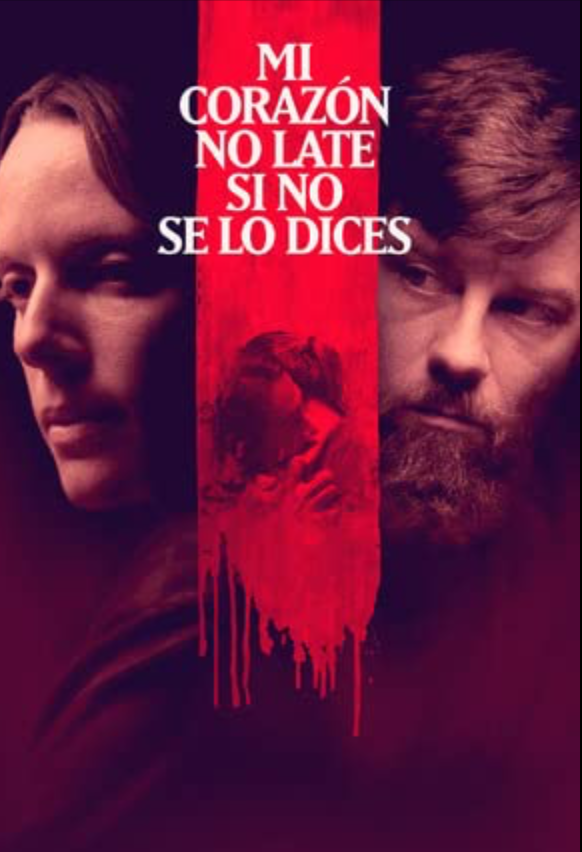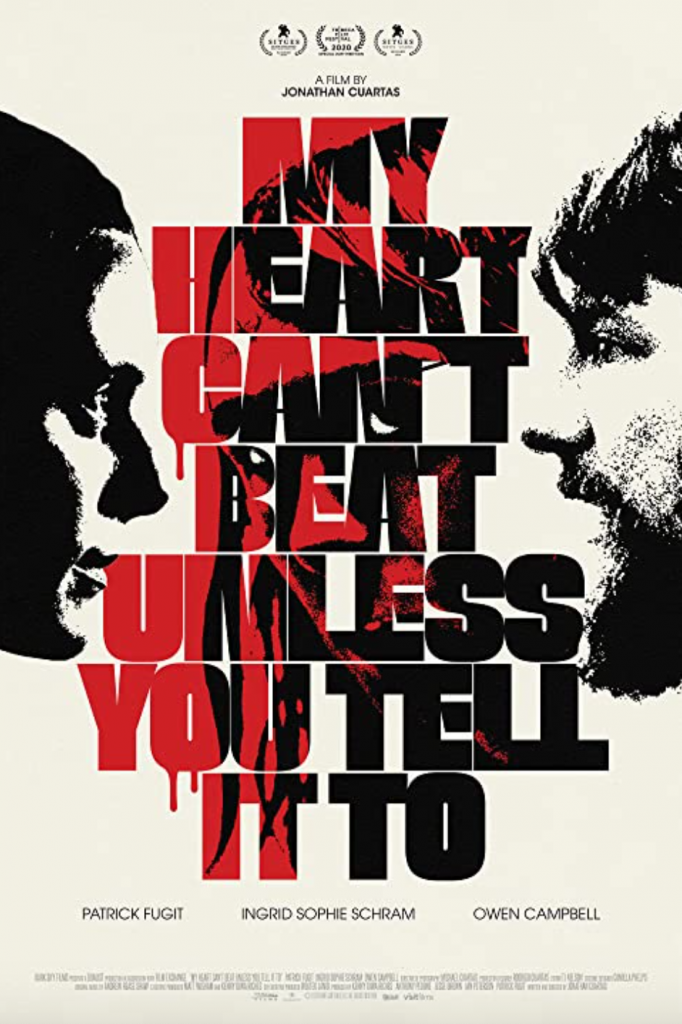
Crafting an emotionally relatable and gripping genre movie that thrives on its unique blend of somber thematic tones and imagery, as opposed to only its terrifying visuals, isn’t always an easy task. But up-and-coming scribe-helmer, Jonathan Cuartas has done just that with his new horror thriller, My Heart Can’t Beat Unless You Tell It To.
In his feature film writing and directorial debut, which highlights remarkable performances from its main trio of actors as they emphasize the delicate intricacies of family relationships and dynamics, Cuartas has proven that he’s a filmmaker to watch. Along with his restrained technical approach, which includes sparse framing and sharply wound focus, his overall helming approach weaves the mythological elements of the feature’s story into a neo-realist family drama that elevates the traditional micro-budget American indie into a truly unique project.
My Heart Can’t Beat Unless You Tell It To follows Dwight (Patrick Fugit, who also served as a producer) as he prowls the streets after dark. He searches each night for lonely and forlorn people who won’t be missed. Dwight takes no joy in his quest, but he needs the strangers’ blood. Without fresh human blood, his fragile young brother Thomas (Owen Campbell) cannot survive.
Each death takes a larger toll on Dwight, as the burden of his crimes weigh heavy on his conscience, and threaten to crack his spirit. But Thomas and his sister Jessie (Ingrid Sophie Schram) are all the family Dwight has left. As a fiercely private and close-knit family unit, they depend on him and the rituals they’ve learned in order to keep their secret. But while Dwight yearns for another life, Jessie and Thomas need them to stay together, which causes a permanent drift between the siblings.
Cuartas and Campbell generously took the time recently to talk over the phone about writing, directing and starring in the movie. The feature is based on the filmmaker’s 2017 short drama, Kuru, which he wrote, directed, produced and edited.
My Heart Can’t Beat Unless You Tell It To is opening this weekend in theaters and on VOD and digital platforms, courtesy of Dark Star Films. The thriller’s official release comes after it screened earlier this month in the 2020 Official Selection: Features section at the Tribeca Film Festival. The drama’s screening at this year’s festival came after it was scheduled to have its world premiere at last spring’s festival before it was cancelled, due to COVID-19.

Q: Jonathan, you wrote the script for the new horror thriller, My Heart Can’t Beat Unless You Tell It To. What was you inspiration in scribing the screenplay, and what was the process like of putting the story together?
JC: The feature is based on one of my short films (Kuru), which I used as a proof of concept to find investors. When I started writing the script for the feature, it took about two-and-a-half years to get it to a good place.
It came from a very personal place, and was sort of inspired by the experience I had when my grandmother was in hospice. The film’s story is based on co-dependency within families, and the sacrifices that we all make for one another.
I’m also a big fan of the horror genre, so I thought vampirism was a good subgenre to take on the film’s theme. I used it as a vehicle to explore this idea of co-dependency.
Q: Owen, you play Thomas in the movie. What was it about the character, as well as Jonathan’s overall script, that convinced you to take on the role? How did you become attached to star in the drama?
OC: I had a quite funny initial encounter with the story. There was a logline for the film on the website for one of its production companies, Dualist, which was also one of its initial investors. Besides the brief description of the story, there were also some images and graphics they designed for the film.
This was months before Jonathan approached me. A friend of mine, who’s a producer, happened to find the information and sent it to me. We were talking about vampire films, so she sent me the information and said, “This sounds like something you would like.” I thought, that does sound like a cool movie, and then I totally forgot about it.
Later on, when Jonathan approached me, he was very candid and didn’t play any games; he said, “I want you in this film.” So I mystified that on the width of the universe, I somehow stumbled upon the project before he even approached me.
When I then read the script, I loved it. I thought it was really well defined, and the vision was very clear.
When I then talked to Jonathan about it, I thought he was a kind and gentle soul, and he seemed to have a very clear vision about the story. So I was overjoyed to jump onto the project.
From there, it was just about getting me out to Salt Lake City, where we shot the film. Once we got to the set, Jonathan was all about collaboration, and incorporating some of my small ideas into the story, and I was grateful to have that opportunity.
Q: Jonathan, in addition to writing the screenplay, you also directed My Heart Can’t Beat Unless You Tell It To. How did working on the script influence your helming style throughout the production? How would you describe your overall directorial style on the set?
JC: It was very intimidating, but my brother (Michael Cuartas), was my cinematographer, and I’ve worked with him for years. We go into projects thinking we can never plan too much, so we went into this film with that mindset. We planned everything very intensely, so that we wouldn’t stumble on set.
To be honest, I was pretty intimidated by the caliber of actors I was working with on the film. But I think you just get into the swing of things. It was fun, and almost felt like a short film, only longer.
So I soon became comfortable with the cast and crew, especially in the way that we developed a visual language. Overall, I felt free to explore and collaborate with everyone.
But there are always challenges, especially with the timing. We shot this in 20 days, so we had a tight schedule. But I was surrounded by friends and friends of friends, so we felt like a family out there, and I think that’s what got me through it.
Q: Speaking about the rest of the actors, particularly Patrick Fugit and Ingrid Sophie Schram, what was the overall casting process like for the film?
JC: Patrick Fugit is actually childhood friends with one of our lead producers, Kenny Riches. So Kenny sent Patrick the script without telling him what it was about, or even telling him that it was a horror film.
I think that caught Patrick by surprise, and he thought it was pretty exciting that the story starts off as a dark drama before his character drains the blood of one of his victims. I think Patrick was also excited about the fact that the film seamlessly and quickly switches between horror and drama between scenes.
Patrick also decided to come on board after he saw the short film because he thought my brother and I had good taste, and were really prepared. Like I said before, we took planning into account, and wanted to make sure that everything went well on the set.
In terms of casting Ingrid Sophie Schram, we actually had another actress attached to play Jessie before Ingrid signed on. Unfortunately, the original actress had to back out, but I now think that it was a blessing in disguise because I don’t think that anyone else could have portrayed Jessie like Ingrid did.
Ingrid signed on about two weeks before we started shooting, and I had a phone call with her while I was shopping for the character’s wardrobe in Salt Lake City. She asked me a million questions about not just the script, but also the overall production and its logistics, since she was jumping on so quickly.
Overall, I feel very grateful for the entire cast we were able to assemble. I had a great time working with them all.
Q: Once all of the actors signed on to star in My Heart Can’t Beat Unless You Tell It To, what was the process like to work together to build the dynamics and relationships between the characters?
OC: It was a very open group of people. Working with Patrick was great; he was a very playful person on set, which helped build the family dynamic. The kindness he also brought to the set really promoted an intimate working relationship, which I think translated into our characters’ brotherhood. While their brotherhood is so strained by the circumstances that they’re in, Patrick’s openness also allow you to see the care and affection between our characters.
Ingrid and I actually lived together during the production; we shared a house together, and that was quite lovely. I’ve only had that experience once or twice before this film, and I always think it’s beneficial.
Once we got back to the house after each day of shooting, we were able to run the next day’s scenes together. We were also able to talk through any questions that we had. We also really lived like siblings, and went grocery shopping together and cooked for one another. Ingrid really felt like an older sister.
I think Jessie and Thomas have a very special relationship as older sister and younger brother. I think the honesty of their relationship on screen is aided by the fact that Ingrid and I grew to care about each other very much as siblings during the shoot.

Q: Like you both mentioned earlier, the thriller was shot on location in Salt Lake City, and the story mainly takes place in the siblings’ home and on their property. What was the experience like of filming the movie on location in Utah?
JC: I think Salt Lake City was an interesting choice because I originally thought we were going to shoot in my hometown of Miami. But I think it turned out to be much more fitting that we shot in Salt Lake, especially with the weather being so cold there, and we were surrounded by mountains. I think it was the first time I saw snow, and I’m not used to that kind of weather, which helped set the mood.
We were also all stuck in the house together, which made things feel claustrophobic. Even though the set was fun and light-hearted, it also did feel as though we were stuck in there. All of the windows were boarded up, since we shot a lot of scenes that are set at night during the day. So we would even lose track of time sometimes, but that helped set the mood for the actors.
OW: I agree; I loved shooting in that house, and the fact that it was all boarded up, as it made us feel trapped in there. I didn’t even go outside much during our breaks because they didn’t want me getting a sunburn or a tan. So we would all hang out in the basement when we weren’t shooting.
It all felt so cozy and exciting, as well as a little maddening, in the best way, as we had the cast and crew trapped in this little house together. I really loved that experience.
Q: Owen, what was the process like of also creating the physicality for your character of Thomas during the production of My Heart Can’t Beat Unless You Tell It To?
OC: There were a lot of discussions between Jonathan and I about that aspect of my character. My worst fear was that it would be too over the top.
But there was someone on set-I think it was the script supervisor (Adrienne Akers)-who’s also a physical therapist. So she would give me pointers as we began filming that physicality, which was built around the tightness in the hips and stomach. So I wasn’t really limping, but more so sliding and gliding, and every muscle was as tense and frail as possible.
We also took some time to work on what the voice would sound like. I’m a self-critical actor, so I think the physicality lands more than the vocalization, but we did spend a lot of time working on what Thomas’ voice would sound like. That process was really fun, but also intimidating, because my worst nightmare is to work on all of these elements, and then when I watch the film back, think, I look like an actor in that sense. Hopefully those elements don’t look too much like I’m an actor who’s performing.
JC: I like how you also mixed in these vampire movements and physicality into the role, like when Thomas is supposed to be sleeping, you crossed your arms over your chest, like Nosferatu. I’m glad you pushed for that because it’s little Easter eggs like that made your portrayal more exciting for vampire fans.
It was also the way that you grabbed onto walls and laid down on the couch and covered yourself with the blanket. That wasn’t something that I really thought about when I was blocking your scenes; I was being more practical, and thinking more about where people were going to be standing. I’m glad you put that into the fold because it dictates the weakness of the character and the dependency that he has on his siblings.
Q: The drama screened during this month’s Tribeca Film Festival as part of its 2020 Official Selection: Features section. What does it mean to you both that the thriller was chosen to return to this year’s festival, after it was scheduled to have its world premiere at last year’s edition?
JC: It’s an honor, of course. Last year was tough since we weren’t able to go to this, or any other, festival in person, due to COVID, so I started to question myself as an artist. So it was really validating that after all we went through last year, we were able to end, instead of start, our festival run with Tribeca. (Besides the Tribeca Film Festival, the movie also screened at The Sitges International Fantastic Film Festival, the Cleveland International Film Festival and Panic Fest.)
We were all able to see the movie in a theatrical setting outdoors during Tribeca. It was so nice to connect with the audience in person and answer their questions face-to-face.
OC: It was an amazing experience. It was easy for everyone to imagine that sharing the movie with people in a theater, or even in an outdoor setting, was going to take longer than it did. In my most pessimistic views of the future, this shared experience of watching movies, which I love, was going to disappear. Obviously, that’s not what happened, which is great.
As an actor, I absolutely adore watching movies with strangers because you learn something about your own art, as well as art in general. You can hear the reactions of so many different people, which is something that I think Tribeca does so well.
Tribeca also made sure that this edition, which marks its 20th anniversary, and is also the first in-person festival after the horrors of the height of the pandemic, people were able to back together to share art. They’re also committed to being New York’s festival, so we got to see it in Staten Island, which was lovely. I was able to bring my brother and a dear friend, and I was grateful that I was able to share that experience with them.
Q: My Heart Can’t Beat Unless You Tell It To is opening this week in theaters and on VOD, courtesy of Dark Sky Films. What does it mean to you both that audiences across the country are now going to be able to see the movie, either in theaters or on digital platforms?
JC: It’s a privilege to have teamed up with Dark Sky, and I’m grateful that they’re pushing the film in the U.S. I want to hear more of the audience’s reactions about the film; at the end of the day, and to start an overall conversation about the film.
It would also be nice to go to more physical screenings. We’re having a theatrical release in my hometown of Miami, so I’ll see a bunch of my friends and family at Tower Theater. I’m also referring everyone to their respective theaters, or to buy or rent the movie on Apple TV+. I’m excited to engage in conversations with more people about the film after they see it.
OC: I’m also grateful that Dark Sky is giving Jonathan this opportunity because I believe in the film, so it’s validating to hear that other people also believe in the film. I know all the work that Jonathan put into the film, so we want people to see it, and share in our observations about life. So I’m grateful that we get to share the film with a wider audience after its festival run.
Here’s the trailer of the film.

